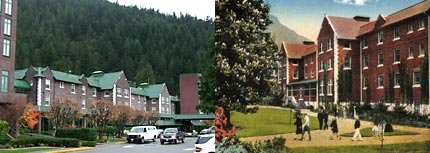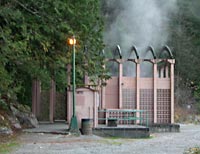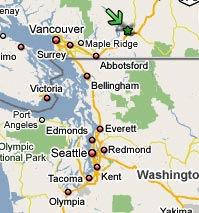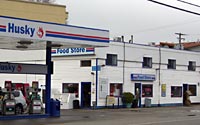Harrison Hot Springs, BC Canada
A sleepy quiet backwater town with
lovely hot springs and beautiful surroundings
|
|
Ringed by mountains on
three sides and the lake on the fourth side, this photo
shows the town's major hotel (the Harrison Hot Springs
Resort); with the rest of the town hidden in the trees to
the left and out of the picture.
Part
One of a three part series on Harrison Hot Springs, BC;
part two suggests
where to stay and eat,
part three reviews
the Harrison Hot Springs Resort in detail, and part four offers suggestions on
what to see and do.
|
Only 85 miles east of
Vancouver, and 150 miles north east from Seattle is Harrison Hot
Springs, a small town of about 1600 people.
As its name implies, it is the
site of some natural mineral hot springs, and is in a
beautiful part of British Columbia and the Pacific Northwest.
Whether you visit for the hot
springs or just for the beauty and relaxing ambience, Harrison
Hot Springs is sure to please and to reward you with a positive
experience in return for your visit.
Why Visit Harrison Hot Springs?
Harrison Hot Springs in BC is just over a 90 minute drive from
Vancouver, BC and about three hours from Seattle, WA. This makes it a great
place for a weekend getaway for people living in the I-5/Hwy-99
corridor,
and is not too distant to encourage visitors to add it to their
time in the Pacific Northwest.
Some people visit to 'take the waters' in the hot springs, and
others visit simply to enjoy a 'get away from it all' relaxing
break in a beautiful natural environment. There are no big name international hotels, no chain fast-food
restaurants, and no fast paced life in general. Parking is
free, and there are no stop lights in the tiny town, which
you'll probably walk around rather than drive once you
get there anyway.
Like many destinations, Harrison Hot Springs allows you to pick
and choose the style of vacation you want. Some people
will want to do nothing except enjoy its beauty and tranquility.
But for those seeking a more active experience, there is plenty
to see and do in the area, ranging from farm tours to fishing,
from
eagle watching to golf.
A Quick History of Harrison Hot Springs

Now and then - the rebuilt Harrison Hot Springs Resort in
1930 (after a fire in 1920 destroyed the earlier buildings) on
the right, and - on the left - as it is today, with tower blocks on either side
now dwarfing the main building.
The hot springs have been known to the local 'First
Nations' Indians for a long time, and were called 'Waum Chuck'.
They were considered a supernatural place, and the water was
believed to have curative powers if drank.
It is generally considered that the official white settler discovery of the hot
springs occurred in either 1858 or 1859. Apparently three
miners were either traveling to or returning from the Cariboo
gold fields (stories differ!) and the town of Douglas (at the time one of the
largest towns in BC and starting point of the Cariboo Trail, but
today totally vanished) at the top of Harrison lake. As they
neared the bottom of the lake, their canoe tipped over and they
fell out. The miners discovered, to their surprise (and
relief), that
the water was warm rather than cold.
The hot springs were first named 'St Alice's Well' after Alice
Douglas, daughter of then BC Governor James Douglas.
Harrison Hot Springs, Harrison lake, and the Harrison river were
all named after Benjamin Harrison, who was a director and deputy
governor of the Hudson's Bay Company until 1886.
With the start of the gold rush in 1858 and until 1866, access
to the gold fields was exclusively via the river and lake, then
on up the Cariboo Trail from the top of the lake. In 1866
the Fraser Canyon Highway was opened, providing a more
convenient way of traveling to and from the gold fields.
In 1873 the springs and 40 acres of land surrounding them were
purchased by Joseph Armstrong, and he announced ambitious plans
to create a major health spa at the site.
 After solving
the problem of how to get the water from the spring (and keeping
the lake water out), he proceeded to build a bathhouse at the
spring site itself, and then piped the hot water (145°F
or 63°C when first emerging from the ground) along the lake
shore to where he built the St Alice Hotel, located where the
modern Harrison Hot Springs Resort's tennis courts are. After solving
the problem of how to get the water from the spring (and keeping
the lake water out), he proceeded to build a bathhouse at the
spring site itself, and then piped the hot water (145°F
or 63°C when first emerging from the ground) along the lake
shore to where he built the St Alice Hotel, located where the
modern Harrison Hot Springs Resort's tennis courts are.
The spa source as it is today can be seen
in this picture, and is a pleasant short stroll along the
lakefront from the Resort.
The hotel was opened in 1886, at which time the Canadian Pacific
Railway started service to nearby Agassiz.
The bathhouse, with capacity for 50 guests
at a time, was destroyed by fire in 1905 and never rebuilt.
The hotel was also destroyed by fire in
1920. It was replaced in 1925 by the building which now
forms the central part of the resort, and renamed the Harrison
Hotel. It was a popular place, and was the first 'resort'
style destination in southwestern BC.
There was little else to the town except
the hotel for many years, and because the hotel had a monopoly
on the hot springs water, there was no opportunity for other
hotel/spas to be built nearby.
During World War 2, the hotel became a
sanitarium for returning servicewomen from Europe.
Shortly after the war, the hotel re-opened, and enjoyed steadily
growing popularity. The hotel acted as an 'anchor' for the
town as a whole, and employed growing numbers of people, to the
point where the town incorporated in 1949.
A public pool was built and opened in 1967. The hotel
agreed to share some of its water with the public pool, giving
people who were not hotel guests a chance to bathe in them in
the public pool.
In 1999 the Harrison Hotel was renamed the Harrison Hot Springs
Resort, and then, in 2001 with its further expansion and opening of the
new Healing Springs Spa, it was given its current full formal
name - the Harrison Hot Springs Resort and Spa.
The town established a tourism office in 2007, and their efforts
seem sure to encourage further growth and better recognition of
the area into the future.
Today there is a population of about 1600 people in the town of Harrison Hot
Springs.
The Weather in Harrison Hot Springs
Summers are warm to hot and reasonably dry. Day
temperatures regularly go above 80° and
sometimes exceed 90°. Due to the northern latitude, the
days are long and sunny.
In the winter, the days are of course
shorter, colder and wetter. There may be a couple of light snow
falls each year, but the snow quickly melts away.
In general, it is probably a bit warmer
than Vancouver in the summer and a bit cooler than Vancouver in
the winter.
Getting to and from Harrison Hot Springs
 (Click
image to open a larger more detailed map) (Click
image to open a larger more detailed map)
Most people will drive to Harrison Hot Springs. But if
you're traveling from further afield than easy driving distance,
you'll first wish to fly in to a nearby airport and then
probably use a rental car to get the rest of the way to the
town.
There are two main nearby airports - Abbotsford, which is the
closest, and Vancouver. In addition, you could also
consider Bellingham or Seattle and drive from there (check that
you can take a rental car across the border in such a case).
Abbotsford Airport (airport code YXX) is the closest and has
some services provided by Westjet as well as small regional
airlines. Vancouver (airport code YVR) is a major
international airport and has plenty of flights from many
places.
It is about a 45 minute drive from Abbotsford and a 90 minute
drive from Vancouver Airport.
Driving to Harrison Hot Springs from Vancouver
There are two main routes to drive between Vancouver and
Harrison Hot Springs. The fastest route is proceeding
along the Trans-Canada Highway (Highway 1) to exit 135 and then following
the signs from there up to Harrison Hot Springs (HHS).
This will take you about 90 minutes from downtown Vancouver to
HHS, and is a distance of 80 miles (130km). The entire
length of the highway is limited access motorway/freeway, with
at least two lanes in each direction, allowing for quick and
easy travel.
A more scenic route which is shorter but will take you longer to
drive is going via Hwy 7, which runs more or less parallel to
the Trans-Canada Highway and to the north, on the other side of
the Fraser river. This is not a motorway/freeway route.
If you choose to take Hwy 7, we recommend you proceed on the
main Trans-Canada Highway between Vancouver and exit 44
(Coquitlam) then take Hwy 7B north to join Hwy 7. This avoids
the worst of the congested urban part of Hwy 7, while giving you
all the beautiful scenery on the eastern rural part of the drive.
This route is 75 miles (125km) but will take closer to two hours
to drive (of course depending on traffic).
Driving to Harrison Hot Springs from Seattle and the US
In most cases you will travel to Harrison Hot Springs from the
US by driving up I-5, then turning off just north of Bellingham
(at exit 255) and traveling over to Sumas where you cross the
border into British Columbia.
A couple of miles north of the border, you
can then either join the Trans-Canada Highway and continue east
to the HHS turn-off, or you can keep going directly north to Hwy
7 and take the more scenic (but somewhat slower) route east from
there.
It is 150 miles (240 km) from Seattle to HHS, which takes a reasonably
easy 2.5 hours driving time; sometimes longer - depending on traffic and waits to
pass through the border. Fortunately the Sumas border post
isn't as busy as the ones on I-5, so wait times are usually
moderate, although be wary of arriving at a peak time such as
Sunday afternoon when a lot of holiday makers will typically be
returning home in both directions.
Don't forget to fill up your car with gas before leaving the US.
Petrol is about 30% more expensive in Canada. Fortunately
you can almost certainly do a roundtrip between I-5 and Harrison
Hot Springs with plenty to spare from a single tank of gas.
A note for Americans visiting Canada
We suggest you take your passport with you to make crossing the
border simple and uncomplicated. Currently you don't need
a passport, but soon this will change.
If you want Canadian cash, it is best to withdraw some from
an ATM. There are a number of ATMs in Harrison Hot
Springs.
 Beware of paying for Canadian goods with US currency. When
we were there, with a US dollar worth C$1.25, one retailer
(pictured here, Aziz at the Husky Food Store) would
only offer us a 1:1 exchange rate, which was outrageously
unfair. A second retailer offered a rate of US$1=C$1.10
which was still much less than it should be. It is better to get
Canadian currency from an ATM and pay the best 'commercial'
exchange
rate through your bank, and that way you avoid being ripped off by greedy local merchants.
The other excellent strategy is to pay by credit card whenever
possible. Beware of paying for Canadian goods with US currency. When
we were there, with a US dollar worth C$1.25, one retailer
(pictured here, Aziz at the Husky Food Store) would
only offer us a 1:1 exchange rate, which was outrageously
unfair. A second retailer offered a rate of US$1=C$1.10
which was still much less than it should be. It is better to get
Canadian currency from an ATM and pay the best 'commercial'
exchange
rate through your bank, and that way you avoid being ripped off by greedy local merchants.
The other excellent strategy is to pay by credit card whenever
possible.
Lastly, your cell phone will almost certainly internationally
roam and work just fine in Canada. But - be careful.
You might find yourself paying as much as $1/minute for the
calls you place and receive, because you're now in a different
country and most US cell phone plans don't offer free roaming in
Canada.
Trains and Buses
Canada's Via Rail has train service to nearby Agassiz and to
Chilliwack as part of its train service between Vancouver and
Toronto, with three trains a week available in each direction.
If you wish to travel to either place, you need to arrange for
the train to make a special stop and this is offered only on
some trains, and requires 48 hrs advance notice. Some
trains stop in Agassiz and others in Chilliwack.
Greyhound operates several buses each day between Vancouver and
Chilliwack.
Boat
If you have a not unduly large sized boat, you can probably
navigate all the way to Harrison Hot Springs from Vancouver and
Puget Sound, traveling via the Fraser and Harrison rivers.
Needless to say, if you choose to do this, ensure you have the
latest charts and check with marinas along the way for
conditions and mooring facilities.
How Long to Stay in Harrison Hot Springs
There's not a huge amount to see in Harrison Hot Springs. But most
people who choose to visit are not seeking to create an action
packed itinerary filled with activities all day every day - it
isn't that sort of area.
This is not to say there isn't a range of things to see and do
in and around HHS, and we detail
what to see and do in
Harrison Hot Springs in the fourth part of this
series. But most people go to HHS to relax, to take it
easy, and perhaps to soak in the hot pools.
As such, HHS is an ideal weekend getaway for working couples who
live in the Seattle/Vancouver region. Go there after work
on Friday, stay two nights, and return home on Sunday afternoon;
or for a real treat, stay over Sunday night as well and turn up
for work slightly late, but very refreshed, on Monday morning.
Retirees could take advantage of sometimes lower rates and fewer
people by visiting during the week, and perhaps they might also choose to
stay for more than two nights.
Read more in Parts 2, 3 and 4
Be sure to read the
information about
where to stay and eat
as part two of this series, part three
reviews the Harrison Hot
Springs Resort in detail, and part four offers suggestions on
what to see and do.
Related Articles, etc
|
If so, please donate to keep the website free and fund the addition of more articles like this. Any help is most appreciated - simply click below to securely send a contribution through a credit card and Paypal.
|
Originally published
5 Dec 2008, last update
30 May 2021
You may freely reproduce or distribute this article for noncommercial purposes as long as you give credit to me as original writer.
|

